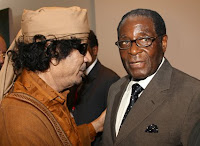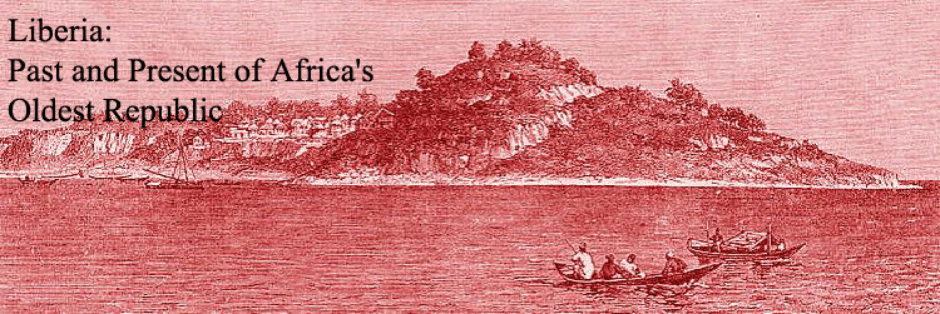In January, Tunisia’s President Ben Ali fell and in February Egypt’s President Hosni Mubarak. Will in March the Libyan people oust its leader, Muammar Muhammed al-Gaddafi aka Colonel Gaddafi? Where will Gaddafi go to? To his friend Robert Mugabe in Zimbabwe?
 Will he join Ethiopia’s former dictator, ‘the Red Emperor’, Mengistu Haile Mariam, who lives just outside the capital of Harare, or will he share the fate of Romanian president Nicolae Ceausescu who was dethroned by a people’s revolution and after a two-hour trial executed? Both Gaddafi and Ceausescu created a pervasive personality cult and in the end were completely disconnected from reality. Or will Colonel Gaddafi follow former Liberian dictator Charles Taylor’s footsteps in The Hague and stand trial before the International Criminal Court for human rights violations, mass murder and crimes against humanity? Will his reign come to an end by revolutionary forces or will there be a US-led military intervention to stop an emerging civil war causing tens of thousands mainly migrant workers to flee to neighboring countries? How many uncertainties there are, there is no doubt that Gaddafi is on his way out. His widely televised delusional speech yesterday reminds us of the Iraqi Information Minister who standing before a camera in 2003 denied the advancement of US troops while bombs exploded behind his back.
Will he join Ethiopia’s former dictator, ‘the Red Emperor’, Mengistu Haile Mariam, who lives just outside the capital of Harare, or will he share the fate of Romanian president Nicolae Ceausescu who was dethroned by a people’s revolution and after a two-hour trial executed? Both Gaddafi and Ceausescu created a pervasive personality cult and in the end were completely disconnected from reality. Or will Colonel Gaddafi follow former Liberian dictator Charles Taylor’s footsteps in The Hague and stand trial before the International Criminal Court for human rights violations, mass murder and crimes against humanity? Will his reign come to an end by revolutionary forces or will there be a US-led military intervention to stop an emerging civil war causing tens of thousands mainly migrant workers to flee to neighboring countries? How many uncertainties there are, there is no doubt that Gaddafi is on his way out. His widely televised delusional speech yesterday reminds us of the Iraqi Information Minister who standing before a camera in 2003 denied the advancement of US troops while bombs exploded behind his back.
It is the end of an era. In 1972, three years after Colonel Gaddafi had seized power and dethroned King Idriss I visited Libya and was very much impressed. The country’s capital Tripoli was well organized, the bonanza of the oil revenues was clearly visible in this sparsely populated country of less than two million people. Nowadays, the per capita income in this North African country is among the highest in Africa, only surpassed by the tiny Central African oil state of Equatorial Guinea.
As referred to in my posts of November 5 last year and January 4 this year, the year 2011 is a year of elections in Africa. The power of the ballot box. Presidential elections are scheduled in 18 African countries: 6 in West Africa (Benin, Cape Verde, The Gambia, Liberia, Niger and Nigeria), 5 in Central Africa (Cameroon, Central African Republic, Chad, Democratic Republic of Congo, and Sao Tomé & Principe) , 3 in Eastern Africa (Djibouti, Seychelles, Uganda), 3 in Southern Africa (Madagascar, Zambia, Zimbabwe), and 1 in North Africa: Egypt. But are the people of these and other countries willing to wait for a democratic opportunity to change their leaders? Already in Egypt, the population made it clear that it did not want to wait until election time, though the change was peaceful.
Is there a possibility that the revolutionary mood in North Africa spreads to Sub-Saharan Africa? In six Sub-Saharan countries the sitting President has been in power for over 20 years and is not considering leaving. Among them Paul Biya, also called the Gaddafi of Black Africa. In February 2008 he merciless crushed a demonstration against hs government leaving hundreds of young Cameroonians dead. Paul Biya has been President of Cameroon since 1982 and although presidential elections are slated for this year, no one expects him to relinquish power. His only senior in Africa is the notorious 87-year old Robert Mugabe of Zimbabwe, in power since the country’s independence from Britain in 1980. The 2008 elections were widely disputed and forced Mugabe into a coalition government with his arch rival now Prime Minister Morgan Tsvangirai. Mugabe is increasingly facing calls to resign but refuses, claiming ‘Zimbabwe is mine – I will never surrender.’
Two other Presidents shot their way to the Presidency: Yoweri Museveni (Uganda, 1986) and Blaise Compaoré (Burkina Faso, 1987). In the February 18 elections, last month, Museveni won more than two-thirds of the votes in elections rejected by the opposition as fraudulent. Burkina Faso’s President Blaise Compaoré had his mandate easily renewed in November 2010.
Prime Minister, not President, Meles Zenawi of Ethiopia and President Idriss Deby of Chad also came to power through the barrel of a gun – both in 1991 and are not considering another job. Deby easily won the February elections of this year in the oil-rich Central African country. Meles Zenawi – increasingly accused of political repression and a disregard for civil liberties – occasionally announces his departure as the country’s de facto leader but nevertheless holds on to power.
There are no clear signs that there will be many substantial political changes in Sub-Saharan Africa in 2011 – neither by the bullet nor by the ballot. But íf a revolt would erupt in countries like Burkina Faso, Cameroon, Ethiopia, Uganda or Zimbabwe nobody can be surprised.
